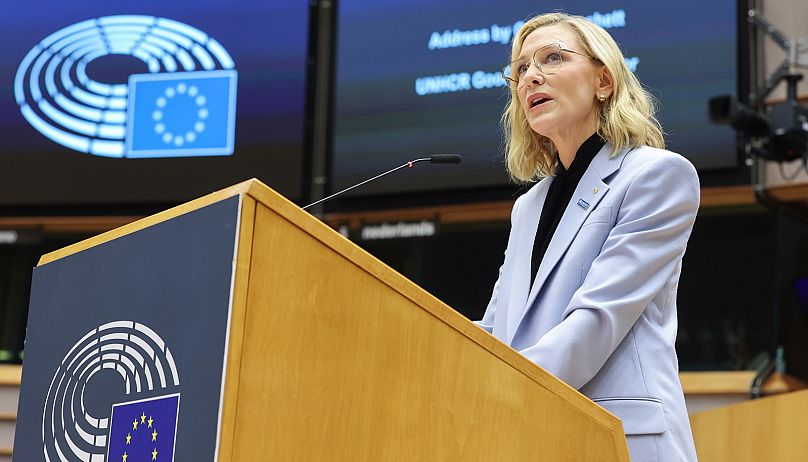"We need to come together to put people, to put our humanity back at the centre and the heart of asylum" policy, Cate Blanchett told lawmakers in an impassioned speech before the European Parliament.
"In ten years' time, people will still be drowning on our shores unless something changes," the Australian actress said, recalling the shipwreck near Lampedusa that left over 360 migrants dead in 2013 and other similar incidents that have happened since then.
 ADVERTISEMENT
ADVERTISEMENT
 ADVERTISEMENT
ADVERTISEMENT
"Complex situations require complex solutions. They require dialogue. They require collaboration, not soundbites or slogans. Finding sustainable solutions in countries of origin, transit and destination is the only way."
The two-time Oscar winner spoke on Wednesday afternoon in her capacity as a Goodwill Ambassador for UNHCR, the United Nations Refugee Agency, upon the invitation of European Parliament President Roberta Metsola. Both held a bilateral meeting before heading to the hemicycle in Brussels, where Blanchett spoke for more than 20 minutes under the watchful eye of MEPs and the crowded gallery of visitors, who repeatedly interrupted her intervention with applause.
"Globally, forced displacement has now passed the grim milestone of 114 million people. Many of those caught up in this maelstrom have made unbelievably dangerous journeys in search of a place of safety," Blanchett said.
"Addressing the challenges of forced displacement and mixed movements requires unity, international cooperation, resources and patient compassionate work to address the multiple and overlapping reasons that people move" out of their countries.
Drawing from the testimonies of the refugees she has met across her trips as Goodwill Ambassador, the actress asked lawmakers to put themselves in the shoes of those who flee "catastrophic experiences" in their homelands and risk their lives to reach a safer port, despite knowing their chances of survival are evidently dim.
Her plea for kindness and empathy took on a special meaning against the backdrop of the humanitarian crisis unfolding in the Gaza Strip, which she mentioned just briefly.
"In the words of the poet Warsan Shire, no one leaves home unless home is the mouth of a shark. You have to understand that no one puts their children in a boat unless water is safer than the land," she said.
Blanchett then urged MEPs to use their power as public representatives to uphold the spirit of the 1951 Refugee Convention and debunk "dangerous myths" stoking "far too much fear and hostility," a reference to the claims frequently used by hard-line politicians to instil in voters a sense of menace and insecurity.
The argument that welcoming refugees puts "too many demands" on state resources, squeezes job markets and undermines traditional values not only shows a "monumental compassion deficit," she said, but also a "disregard for history," as Europe has historically been "crisscrossed" by people fleeing wars, pogroms and other forms of persecution.
"As the representatives of the people of Europe, please remind your constituents that low and middle-income countries host the vast majority, nearly 90% of all forcibly displaced people," Blanchett said, speaking directly to the MEPs in the audience.
"Take this message to them. Challenge false claims that will ultimately only see divisions in our own communities. Scapegoating so often leads to violence and unrest."
In what was perhaps the most political moment of the speech, Blanchett denounced the "harmful" policy of "externalisation," a term that describes the efforts made by Western countries to outsource their asylum responsibilities to neighbouring and, in some cases, faraway countries.
Blanchett's home country, Australia, spent years pursuing a migration policy based on keeping irregular arrivals locked in overseas island detention centres, often for very long periods of time. The system, now on standby, was heavily criticised by UN experts and humanitarian NGOs as abusive and punitive.
But in recent years, other wealthy nations have announced similar plans, including the UK's scheme with Rwanda, which remains stuck in a legal battle, and Italy's brand new plan with Albania, announced only two days ago.
"As an Australian, I can tell you that we learnt the hard way, the devastating physical and mental torment the refugees experienced whilst being corralled offshore. The psychological damage to those guarding them, the billions of dollars of taxpayers money wasted on a now discredited and largely abandoned approach," Blanchett said.
"And may I say to the resultant shame and regret that many of my fellow Australians feel now surrounding these ineffective and inhumane policies."
The speech was capped with a standing ovation from MEPs and visitors.
Widely regarded as one of the greatest actors of the 21st century, Blanchett is known for her commanding screen presence, her effortless versatility and her penchant for taking on challenging characters in auteur movies. Her extensive catalogue of critically acclaimed performances includes Carol, by Todd Haynes; Nightmare Alley, by Guillermo Del Toro; The Curious Case of Benjamin Button, by David Fincher; and Babel, by Alejandro González Iñárritu; as well as her Oscar-winning roles in The Aviator, by Martin Scorsese, and Blue Jasmine, by Woody Allen.
Blanchett's lauded turn as Lydia Tár, the imperious chief conductor of the Berlin Philharmonic whose past sins prompt a spectacular fall from grace, earned her this year her eighth Academy Award nomination.











